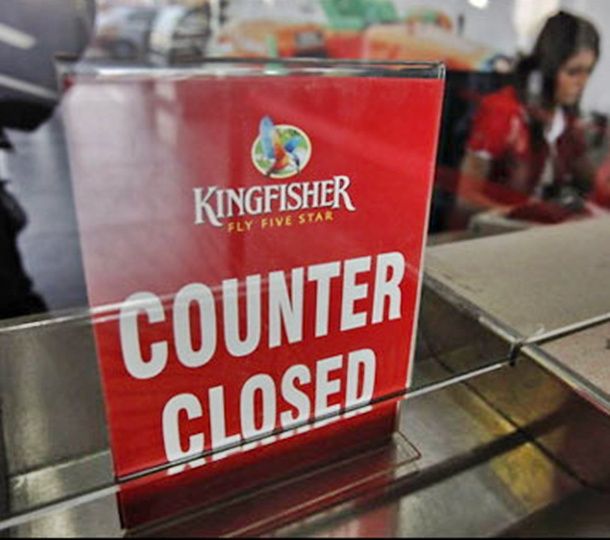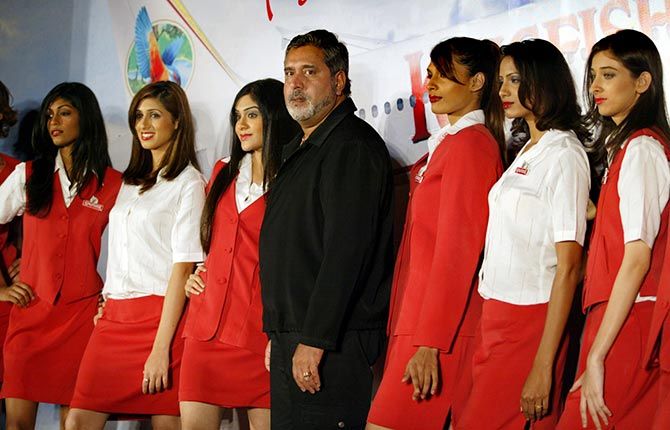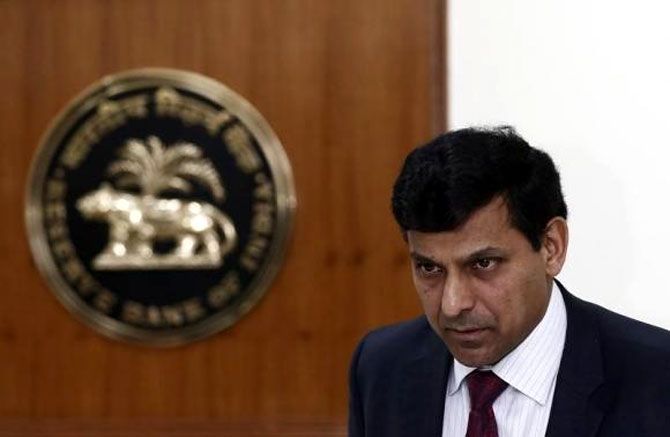'What about Air India, which has exceeded a liability of Rs 40,000 crores to 50,000 crores? Who is responsible for that?'

Vijay Mallya's woes have firmly trained the spotlight on public sector banks and long terms loans.
As experts weigh in, Shobha Warrier/Rediff.com spoke to senior banker P R Kalyanaraman.
After retiring as general manager, Bank of India, Kalyanaraman, image, below, joined Federal Bank Ltd as its executive director. Currently he is director (south), Investment Bank, Centrum Capital Ltd.
As a former banker, do you think public sector banks are in a mess now?
No, I don't think they are in a mess. I would say they are in a difficult situation. The banks are not the only reason for this situation.
Do you hold the Reserve Bank of India responsible?
Agencies like the RBI, the finance ministry, the investigating agencies, the clients and the banks all have their roles to play.
We were in a very difficult situation in the nineties after liberalisation, when I was working with Bank of India but all banks were able to recoup and subsequently perform well.
It was possible because the government understood the situation and banks were given a lot of support to overcome it.
What kind of support did the PSBs get then?
The tightening of norms by the RBI, which is happening today, was not there then.
For example, you know that banks have lent money to corporates, many of whom have created assets. It is not that all of them are wilful defaulters or have diverted money.
If they have diverted working capital to fixed assets, it is pardonable as money is still in the system and can be used to recoup.
If you want, you can put those assets to productive use.
Like what the State Bank of India is trying with Vijay Mallya's assets?
Those were his personal assets. I am not talking about that.
In the case of Kingfisher, if they had tried to sell the aircraft with the permission of the unions and borrowers when they found it was not possible to turn the situation around, somebody else would have used the assets.
Today, after four years, after you have allowed the assets to deteriorate, the situation is different.
Why did the banks allow it to reach such a level in Mallya's case?
I have a different opinion on Vijay Mallya's case. According to me, the media is creating unwanted hype.
See, his borrowing was around Rs 4,000 crores (Rs 40 billion) which got compounded to Rs 9,000 crores (Rs 90 billion).
What about Air India then, which has exceeded a liability of Rs 40,000 to Rs 50,000 crores (Rs 400 billion to Rs 500 billion) ? Who is responsible for that? Has anybody analysed it?
There are companies which have larger liabilities than Mallya's. I am not defending him. I have not lent him money.
The approach towards Mallya is not right because his unit could have been turned around earlier with additional funds from his side and the bank's side. I remember the union going on strike for a pay rise at the time when the company was going through bad times.
Banks also depend on the analysis made by private investors. You need to remember that they also put in their hard earned money and do their due diligence.
When the economy is sinking, many of the calculations go wrong. That would have also partially contributed to the decline in the fortune of the company.

Why did the banks go on lending him money when Kingfisher was doing badly?
Let's suppose I, as a banker, have lent you Rs 100. If I see that by pumping in another Rs 50, your unit can be revived and there is a possibility of your making profit, I will do so.
In hindsight, you can find fault with every decision. But any decision should be analysed understanding the situation that was prevailing at the time it was taken.
You take a decision with the belief that the unit could be revived. You give additional Rs 10 crore (Rs 100 million) on the assumption that the Rs 100 crore assets could be revived.
You cannot judge a decision made in the past on today's conditions.
Does that mean you will not hold Mallya or the banks that lent him more money responsible for the present situation?
I will hold them responsible, but you have to analyse whether the decisions were taken properly and effectively. There could have been an error of judgment. I would not like to say anything without going through the complete facts, which the media is doing now.
It is a pity that political parties are jumping into the fray. They are not the people running the banks.
Do you feel the media is creating noise and panic without understanding or analysing the situation?
Hundred per cent. In many cases, the media is judgemental without understanding the case; this is one such example.
Did they analyse the case and the situation at that time? Have they gone through the project report prepared by KFA when they launched the airline?
Don't you hold the RBI responsible for the current panic about the PSBs? For example, non-performing assets have been piling up for many years.
Why did the RBI come out with the asset quality review asking banks to declare all the NPAs, which put all the banks in the red?
After liberalisation, banks started mobilising deposits and the money flowed in. In order to pay interest to the depositors, they have to lend the money.
Lending avenues were very limited then as banks were under government control, making them do priority sector lending, agricultural lending, DRA rate lending, etc.
After all these compulsions, the amount of money they could lend to corporates was limited. So bankers vied with each other to lend to long term projects.
At that time, asset liability was there because, while the time span of deposits is five years, lending for infra and power projects was long term.
Otherwise, these projects are not viable.
But all commercial banks here were lending to large projects on a repayment schedule for 10 years. PSBs were not permitted to lend beyond that period. That was the rule.
The RBI was aware of this, but didn't rectify it. They could have permitted the banks to lend for a longer period or given them avenues to raise resources for a longer term at a lower rate of interest.
Members of the RBI were on board when the banks were lending to infra projects. It was not as if they were unaware of what was happening. But, today, they are blaming the banks.
I do not blame anyone as lending to long term projects was an unknown territory for commercial banks; they did not understand it properly. The same was the case with the RBI as well.
Thirdly, we had lending institutions like the IDBI (Industrial Development Bank of India) that were created only for long term projects. They were meant to analyse those projects, had the training and the expertise to do so and were given funds for long term projects.
Then, the RBI permitted these institutions to convert to commercial banks. As a result, they started losing the expertise they had.
People who were trained to lend for the long term entered the commercial space where they had no expertise and banks started lending long term, an area where they had no expertise. Both started making mistakes.
Today, IDBI is a loss-making institution. I do not know why the RBI or the finance ministry does not look into this mistake.
We also had a system where any long term loan application went to a consortium where there would be a lead bank with representatives from other banks. They jointly analysed a project before lending.
Suddenly the RBI wanted to do away with this; probably because the borrowers were clamouring for its removal.
Though it had its positive and negative points, this was done away with somewhere in the late nineties and banks were allowed to lend on their own.
This resulted in borrowers whose intentions were not good taking advantage of the banks. Now, they are re-introducing the idea saying any project asking for more than Rs 150 crore (Rs 1.5 billion) should go through the consortium process except for the State Bank of India.
The RBI should have relaxed certain norms when the economy was doing badly. Many projects that are good, and whose intentions are good, fail when their calculations go wrong.
Earlier, bankers had the liberty to restructure loans, but the RBI tightened the rules and things became worse.
In the normal course, I would say the RBI tightening the screws is good, but not under such circumstances.
Because of this, instead of supporting a unit in difficulty, bankers started withdrawing from even the good units. This led to many productive units closing down and people losing jobs. You are also allowing assets created out of public funds to rot.
These are issues the RBI could have controlled.

NPAs are piling up and it is said the amount has gone up to Rs 10 lakh crores (Rs 1 trillion). Why do you think the RBI suddenly woke up and asked banks to declare their NPAs?
They are trying to implement measures used by developed countries here. Yes, we have to improve our regulatory control, but when times are very bad, the RBI should have had an independent approach.
I am not saying the rules are wrong. I am saying they should have made exemptions for good and honest projects that can be revived.
They should have been judicious and the authority should have been given to the banks. After all, it is their business.
Now, the accounts which would have pulled along for some more time have become NPAs.
Asset reconstruction companies have never acted as restructuring companies, but as companies that sell the assets and make profits. This was also not effectively regulated by the RBI.
The other day, the government said it would pump in Rs 1,000 crore (Rs 100 billion) to three banks that were in the red. Will this solve the problem?
When NPAs go up, the capital adequacy ratio goes below the threshold. When that happens, capital has to be pumped in so that the common man doesn't suffer.
If you do not want the banking system to fail, it has to be supported.
Banks are handicapped today. Earnings are dwindling and they cannot lend because the capital adequacy ratio is not adequate.
After pumping in money, the government should see to it that the banks are run professionally. Right now, the government has not encouraged meritocracy in PSBs. That is why you don't have effective management.
Many people say professionalism and accountability don't exist in public sector banks. As a former banker, do you agree?
There are a substantial number of highly professional people, both in private and public sector banks. Whether they are getting effective recognition in PSBs is the question.
In a public sector bank, everything except merit is given consideration; in a private sector bank, merit is given due consideration. So PSBs tend to lose professionals.
 What about accountability?
What about accountability?
Accountability is an area where the RBI, bankers, the government and the investigating agencies have to be responsible.
Accountability in banks should be based on the concept of businesses. Now we hear the investigating agency saying a banker is accountable for any account going wrong. That is a very wrong statement.
Accounts can go wrong for various reasons like the general economic situation, which is what is happening today. It could also happen because the promoter fails in some department.
Even the multinationals are failing. Tata is selling Corus. When they bought it, it was the right decision. Now, with Europe's economy failing, the Tatas are right in selling it.
In PSBs, accountability means a CBI investigation, court cases, losing your promotion and retirement benefits.
With the RBI and the finance ministry shouting about accountability, bankers naturally want to be safe; they don't want to take risks. So they don't take decisions.
When you don't take a decision, there is no wrong decision. How do you expect performance when you have effectively discouraged bankers from taking decisions?
When we started talking, you said the public sector banks were in a difficult situation. Do you think they can come out of it?
If banks are given a free hand when it comes to handling difficult accounts, get support in handling units that are viable and are encouraged to take tough decisions, I don't see why a turnaround cannot take place.
How long do you think it will take?
We were in a worse situation in the nineties, and we came out of it. But remember, what has happened in a decade cannot be rectified within weeks or months.
If there is no unwanted media hype or unwanted statements from the government, if you leave it to the bankers to handle the situation and if the required support is given to them immediately, they can come out of this in two years.











 © 2025
© 2025